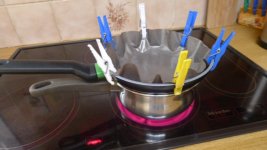Several tec's use the property of HCl (muriatic acid) to evaporate when dried out.
1) 100 ml dist. water + 3 drops HCl (for analisis, Merck), pH was around 2.5, double boiler evaped, left a few hairs of dry rest, almost nothing.
Trowing 50 ml dist water on top, checking ph = next to 7
So we can say yes the HCl was evaped.
2) 100 ml dist. water + 3 drops HCl (for analisis, Merck), pH was around 2.5 again, now trow in 2 grams of rice flour and mix, double boiler evaped till all BONE dry, had to mortar and pestle the flakes to go back to powder.
Trowing 50 ml dist water on top, mixing, checking ph = next to 2.7 :shock:
So we can say the HCl was NOT fully evaped because of in this case presence of rice-flour.
Now this 2nd test is enough for me to question the HCl evap-tecs, no?
So I am confused about this HCl evap phenomena and it's implications if any.
1) 100 ml dist. water + 3 drops HCl (for analisis, Merck), pH was around 2.5, double boiler evaped, left a few hairs of dry rest, almost nothing.
Trowing 50 ml dist water on top, checking ph = next to 7
So we can say yes the HCl was evaped.
2) 100 ml dist. water + 3 drops HCl (for analisis, Merck), pH was around 2.5 again, now trow in 2 grams of rice flour and mix, double boiler evaped till all BONE dry, had to mortar and pestle the flakes to go back to powder.
Trowing 50 ml dist water on top, mixing, checking ph = next to 2.7 :shock:
So we can say the HCl was NOT fully evaped because of in this case presence of rice-flour.
Now this 2nd test is enough for me to question the HCl evap-tecs, no?
So I am confused about this HCl evap phenomena and it's implications if any.

